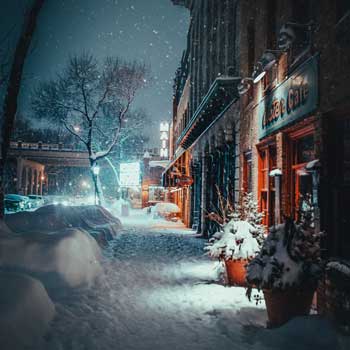Winter means dropping temperatures, puffy jackets and even the occasional dusting of white snow.
When cold weather arrives outside, it’s important to stay warm inside. While huddling around a glowing fire with hot chocolate can keep you nice and toasty, most modern buildings use a variety of other means to maintain a comfortable temperature – many of which are incorporated as key parts of the construction process.
The next time you find yourself thankful to be warm indoors instead of freezing in the frigid outdoors, take a moment to think about the construction craft professionals who helped ensure your home, school or store is pleasant and cozy. Here’s why.

If you’ve ever set the thermostat to your ideal temperature, you’re enjoying the benefits of heating, ventilation and air conditioning (HVAC) systems.
These complex systems are made up of motors, compressors, pumps, coils, fans and control switches that work together to provide environmental comfort. During the hot summer months, air conditioning units can cool down compressed air with refrigerant and cycle it through homes and businesses for a refreshing chill, but during the winter the heating systems that use furnaces or boilers kick in to keep the temperature warm.
HVAC systems don’t just keep it warm inside during the winter. The “V” in HVAC, ventilation, helps to maintain indoor air quality by removing contaminants from the air, including dust, odors, smoke and even bacteria. With people staying inside more and not wanting to open windows for some fresh air due to the cold, ventilation becomes very important during the winter. It’s especially important during the peak of cold and flu season, as proper ventilation can help prevent the spread of airborne illnesses.
When you think of “air conditioning,” you might think of the square outdoor unit that sits next to your house or maybe on the roof of an office or apartment complex. But while these are important parts of HVAC, they are only part of it. Air ducts, electrical wiring and other components are found all throughout a building, and it takes skilled craft professionals such as HVAC Technicians to make those components, install them and maintain, repair or replace them when needed.

Heating the inside of a building is one step but keeping that warmth inside is another.
Based on the science of heat transfer, objects at different temperatures will transfer heat energy from the hotter object to the colder one until they reach equivalent temperatures. This is why your hot chocolate will eventually cool down to room temperature.
In the context of a building, the warm air inside the building will try to escape to the colder outdoors, and cold air from outside will try to sneak inside. Even if the warm air is contained within the walls of the building, heat can still transfer through the materials of the walls if they aren’t made with a good insulator, which is a type of object that reduces heat transfer. The same principle applies if you are trying to keep cool air inside and warm air out.
Because of this, installing insulation is an important part of the construction process. Professional insulators put insulating materials such as fiberglass or foam in or around walls, roofs and pipes, making sure that heat transfer is limited.
Not only does insultation help maintain temperature for comfort, but it also helps to conserve energy and costs. Because HVAC units aren’t needing to work as hard re-conditioning the air to the desired temperature, they use up less electricity, thus saving money on energy bills and helping the environment. Proper insulation is a very important part of sustainability and making buildings greener.
Keeping with the theme of preventing heat transfer, windows and doorways are key areas where heat can slip out or in. Because these fixtures are meant to be open and closed, there are natural cracks and creases where air can slip through. And while glass isn’t actually that bad of an insulator, the panes of glass used in many windows are so thin that heat transfer can occur easily through them.
Installing well-sealed and durable window and door fixtures can help prevent this loss of heat. Many new construction projects are placing these fixtures in from the jump, and many families with older-style homes are upgrading their doors and windows. Glaziers and carpenters are two types of craft professionals who might be involved in installation.
Like insulation, quality windows and doors can increase a building’s energy efficiency and reduce costs on top of maintaining temperature.
While we don’t always think about how skilled professionals in the construction industry affect our everyday life, the truth is that they impact everything we do.
From the shelter over our heads and the power systems that charge our phones, to the technology and techniques that keep our homes warm in the winter, craft professionals make our comfortable modern lifestyles possible.
Interested in learning more about different types of construction pros? Check out Build Your Future’s Construction Careers page.